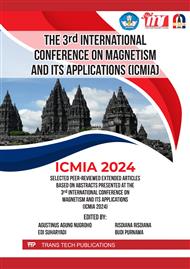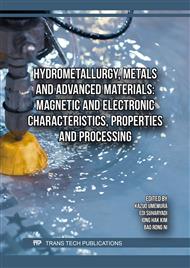[1]
G. Gong et al., "Modulation of magnetic and dielectric properties by Al3+ substitution in Ca3CoMnO6 ceramics," Journal of Alloys and Compounds, vol. 969, p.172357, 2023.
DOI: 10.1016/j.jallcom.2023.172357
Google Scholar
[2]
T. Saha-Dasgupta, "The Fascinating World of Low-Dimensional Quantum Spin Systems: Ab Initio Modeling," Molecules, vol. 26, no. 6, p.1522, Mar. 2021.
DOI: 10.3390/molecules26061522
Google Scholar
[3]
W. Yang et al., "Quasi-one-dimensional metallic conduction channels in exotic ferroelectric topological defects," Nature Communications, vol. 12, no. 1, p.1–11, 2021.
DOI: 10.1038/s41467-021-21521-9
Google Scholar
[4]
Z.-T. Tang et al., "Superconductivity in quasi-one-dimensional Cs2Cr3As3 with large interchain distance," Science China Materials, vol. 58, no. 1, p.16–20, 2015.
DOI: 10.1007/s40843-015-0021-x
Google Scholar
[5]
Q. G. Mu et al., "Superconductivity at 10.4 K in a novel quasi-one-dimensional ternary molybdenum pnictide K2Mo3As3," Science Bulletin, vol. 63, no. 15, p.952–956, 2018.
DOI: 10.1016/j.scib.2018.06.011
Google Scholar
[6]
G. H. Cao and Z. W. Zhu, "Superconductivity with peculiar upper critical fields in quasi-one-dimensional Cr-based pnictides," Chinese Physics B, vol. 27, no. 10, 2018.
DOI: 10.1088/1674-1056/27/10/107401
Google Scholar
[7]
J. Saha et al., "Magneto-electric coupling in Ca3CoMnO6 thin films," Journal of Magnetism and Magnetic Materials, vol. 400, p.282–285, 2016.
DOI: 10.1016/j.jmmm.2015.07.014
Google Scholar
[8]
G. Gong et al., "Relaxor ferroelectric nature and magnetoelectric coupling of the one dimensional frustrated Ca3CoMnO6," Journal of Alloys and Compounds, vol. 908, p.164587, Jul. 2022.
DOI: 10.1016/j.jallcom.2022.164587
Google Scholar
[9]
G. Gong, J. Guo, Y. Ma, Y. Zhang, Y. Wang, and Y. Su, "Spin glass and exchange bias effect in one-dimensional frustrated compound Ca3CoMnO6," Journal of Magnetism and Magnetic Materials, vol. 482, p.323–328, Jul. 2019.
DOI: 10.1016/j.jmmm.2019.03.074
Google Scholar
[10]
Y. Wang, J. Zhou, C. Shi, G. Gong, H. Hu, and Y. Su, "Influence of Al3+ doping on the magnetism of one-dimensional frustrated Ca3CoMnO6 compound," J Sol-Gel Sci Technol, vol. 97, no. 3, p.663–671, Mar. 2021.
DOI: 10.1007/s10971-021-05476-3
Google Scholar
[11]
Y. J. Choi, H. T. Yi, S. Lee, Q. Huang, V. Kiryukhin, and S.-W. Cheong, "Ferroelectricity in an Ising Chain Magnet," Phys. Rev. Lett., vol. 100, no. 4, p.047601, Jan. 2008.
DOI: 10.1103/PhysRevLett.100.047601
Google Scholar
[12]
S. D. Kaushik et al., "Magnetoelectric coupling in Ca3CoMnO6," Journal of Applied Physics, vol. 108, no. 8, p.084106, Oct. 2010.
DOI: 10.1063/1.3499262
Google Scholar
[13]
Y. J. Choi, H. T. Yi, S. Lee, Q. Huang, V. Kiryukhin, and S. W. Cheong, "Ferroelectricity in an ising chain magnet," Physical Review Letters, vol. 100, no. 4, p.6–9, 2008.
DOI: 10.1103/PhysRevLett.100.047601
Google Scholar
[14]
Y. Duan et al., "Magnetoelectric coupling effect in Ga3+-doped Ca3CoMn1-xGaxO6 compounds," Journal of Alloys and Compounds, vol. 952, p.169943, 2023.
DOI: 10.1016/j.jallcom.2023.169943
Google Scholar
[15]
G. Gong et al., "Effect of Zn2+ substitution on magnetic properties of the quasi-one-dimensional spin chain compound Ca3CoMnO6," Ceramics International, vol. 48, no. 23, Part A, p.35160–35165, 2022.
DOI: 10.1016/j.ceramint.2022.08.112
Google Scholar
[16]
G. V Bazuev, V. G. Zubkov, I. F. Berger, and T. I. Arbuzova, "Crystal structure and magnetic properties of a one dimensional complex oxide ca3nimno6," Solid State Sciences, vol. 1, no. 6, p.365–372, 1999.
DOI: 10.1016/S1293-2558(00)80090-4
Google Scholar
[17]
S. Kawasaki, M. Takano, and T. Inami, "Synthesis, Structure, and Magnetic Properties of Ca3BMnO6 (B=Ni, Zn) and Ca3ZnCoO6 Crystallizing in the K4CdCl6 Structure," Journal of Solid State Chemistry, vol. 145, no. 1, p.302–308, 1999.
DOI: 10.1006/jssc.1999.8270
Google Scholar
[18]
J. van den Brink and D. I. Khomskii, "Multiferroicity due to charge ordering," Journal of Physics: Condensed Matter, vol. 20, no. 43, p.434217, 2008.
DOI: 10.1088/0953-8984/20/43/434217
Google Scholar
[19]
S. Rayaprol, K. Sengupta, E. V Sampathkumaran, and Y. Matsushita, "Magnetic behavior of spin-chain compounds, Sr3ZnRhO6 and Ca3NiMnO6, from heat capacity and AC susceptibility studies," Journal of Solid State Chemistry, vol. 177, no. 10, p.3270–3273, 2004.
DOI: 10.1016/j.jssc.2004.05.050
Google Scholar
[20]
F. Izumi and K. Momma, "Three-Dimensional Visualization in Powder Diffraction," in APPLIED CRYSTALLOGRAPHY XX, in Solid State Phenomena, vol. 130. Trans Tech Publications Ltd, 2007, p.15–20.
DOI: 10.4028/www.scientific.net/SSP.130.15
Google Scholar
[21]
D. Flahaut et al., "A magnetic study of the one dimensional Sr3NiIrO6 compound," European Physical Journal B, vol. 35, no. 3, p.317–323, 2003.
DOI: 10.1140/epjb/e2003-00283-3
Google Scholar
[22]
H. Kageyama, K. Yoshimura, and K. Kosuge, "Synthesis and Magnetic Properties of New Series of One-Dimensional Oxides Ca3Co1+xB1−xO6(B=Ir, Ru)," Journal of Solid State Chemistry, vol. 140, no. 1, p.14–19, 1998.
DOI: 10.1006/jssc.1998.7798
Google Scholar
[23]
A. Maignan, C. Michel, A. C. Masset, C. Martin, and B. Raveau, "Single crystal study of the one dimensional Ca3Co2O6 compound: Five stable configurations for the ising triangular lattice," European Physical Journal B, vol. 15, no. 4, p.657–663, 2000.
DOI: 10.1007/PL00011051
Google Scholar
[24]
S. Aasland, H. Fjellvåg, and B. Hauback, "Magnetic properties of the one-dimensional Ca3Co2O6," Solid State Communications, vol. 101, no. 3, p.187–192, 1997.
DOI: 10.1016/S0038-1098(96)00531-5
Google Scholar



